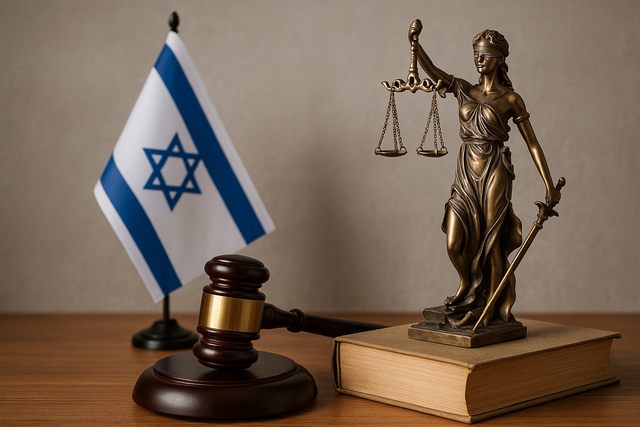The Israeli Court: A State Within a State
The Israeli judicial system — that’s straight-up a whole other damn state inside the state. Unlike a bunch of other countries, we don’t even have a normal constitution. When Israel was founded, the politicians couldn’t agree on the basics: religion, minority rights, borders — all of it was so fucking controversial they just went, “screw it, we’ll write it in chunks.” That’s how the Basic Laws came to be. These half-assed laws ended up playing the role of a constitution, even though they’re patchy as hell. The Supreme Court leans on them when it checks if the government or the Knesset is playing by the rules.

Image: AI generated, sora.chatgpt.com
The Supreme Court here isn’t just the top court. It’s got a double gig: the final appeals court and, at the same time, Bagatz — the High Court of Justice. Which basically means any random person can walk straight in and sue the state. No layers of red tape: you feel like it — you go up against the government, the army, or the mayor’s office. And the court will actually deal with your case. Almost no other country has that kind of shit, but here it’s routine.
Judges get picked through this special committee with politicians, lawyers, and judges themselves. In theory, it’s “balanced.” In reality? Judges call the shots and pretty much decide who joins the club. That sparks endless bitching: “the elite is cloning itself.” But thanks to that setup, the court is really independent from politics. And in a place where governments and coalitions fall apart every damn six months, that independence works like a stabilizer.
Why is the court seen as a state within a state? Because it can strike down laws passed by parliament. Because it jumps into government and army decisions. Because its word is final — for everyone: ministers, generals, mayors. Nobody gets to say: “nah, we don’t agree.” Nope. End of story.
Now some examples where the court really flipped shit around:
— 2005: the government decides to pull Israel out of Gaza. Tons of petitions to Bagatz against the “disengagement plan.” The court sided with the government and gave it the green light to boot thousands of settlers out. Basically, the court signed off on something that split the country in half and still pisses people off.
— 1999: the court ruled Shin Bet can’t use torture in interrogations anymore. Before that, it was all “gray zone”: security guys did whatever the hell they wanted, waving the “national security” card. After the ruling, they had to rewrite the whole damn playbook.
— 2006: Bagatz banned the army from using Palestinians as “human shields” in raids. The army was stunned — the practice was super common. They had to change tactics overnight.
— 2012: the court ordered the demolition of the illegal Migron settlement in the West Bank, built on private Palestinian land. The government stalled, bargained, dragged it out — the court said: cut the crap, tear it down. And they really did tear it down, despite settlers losing their shit and politicians backing them.
— 2023: the court basically booted Aryeh Deri, leader of Shas, out of the government. He got a minister gig despite having convictions for corruption and tax fraud. The court said: nope, guy’s disqualified, not a minister. Period. That hit Netanyahu’s coalition like a truck.
Stuff like this happens regularly. That’s why people don’t see the court as just a boring body that interprets laws — it’s an actual player. It makes decisions that can shape the whole damn country. Doesn’t matter what the government or half the population thinks.
So yeah, the criticism is obvious. People say: the court’s too activist, judges aren’t elected but they run the country like they’ve got their hands on the controls. And truth is, the court is more liberal than most of society, which is overall more right-wing and religious. So it looks like the “elite in robes” is shoving decisions down everyone’s throat.
That all blew up in the judicial reform mess of 2023. The government wanted to gut the court: take away its power to strike down laws, change how judges get picked, limit access to Bagatz. Basically, neuter it. In response, protests exploded. Hundreds of thousands on the streets, reservists saying they won’t serve, the economy shaking, investors spooked. It was a full-blown political shitstorm, close to a civil crisis.
And here’s the kicker: the court isn’t just some legal machinery, it’s a legit power center. For some, it’s the only safety net keeping Israel from sliding into authoritarian crap. For others, it’s this arrogant monster stopping the majority from running the country. But either way, without it Israel would look completely different.
The court really runs the show. And no matter how much people bitch about it, it’s still the place where life-and-death stuff, war and peace, rights and duties get decided. That’s why it’s called a state within a state.
🎉 Congratulations!
Your post has been upvoted by the SteemX Team! 🚀
SteemX is a modern, user-friendly and powerful platform built for the Steem community.
🔗 Visit us: www.steemx.org
✅ Support our work — Vote for our witness: bountyking5